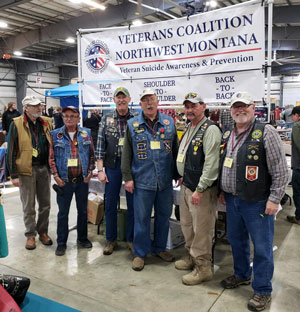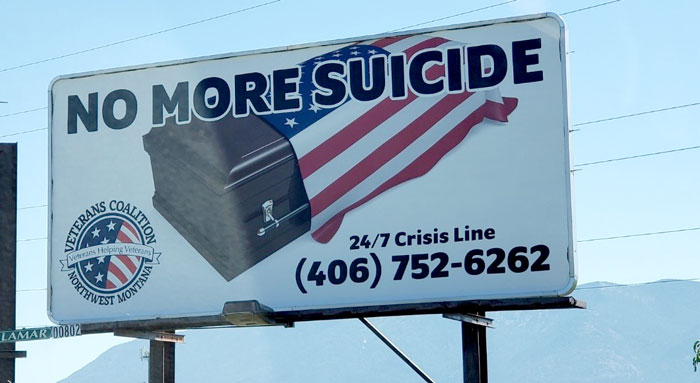Together With Veterans Rural Suicide Prevention Program
- Need: Suicide among veterans has been steadily increasing, and rural veterans have an increased risk of death by suicide compared to urban veterans.
- Intervention: A program called Together with Veterans was formed to help rural communities address and prevent suicides among veterans. The initiative is veteran-led, collaborative, evidence-based, and community-centered.
- Results: Data collection is ongoing.
Description
Veterans who live in rural America are more likely to die by suicide than urban veterans.
Together with Veterans (TWV) is being implemented and evaluated to promote community-based suicide prevention in rural communities throughout the United States. TWV is a multilevel, evidence-based suicide prevention program for rural veterans and those living in their communities. TWV is carried out via collaboration between teams at the Department of Veteran Affairs and the Western Interstate Commission for Higher Education Behavioral Health Program (WICHE BHP), as well as local veterans and other community participants. Through these partnerships, TWV supports the dissemination of best practices in public health suicide prevention to rural communities consistent with the goals of the National Strategy for Preventing Veteran Suicide.
The TWV guiding principles are:
- Veteran-driven
- Collaborative
- Evidence-informed
- Community-centered
The Together with Veterans Suicide Prevention Strategies are implemented using a five-phase process to support rural communities in developing a local veteran suicide prevention action plan. Six evidence-based suicide prevention strategies (Provide Suicide Prevention Training, Enhance Primary Care Suicide Prevention, Promote Connectedness and Help Seeking, Improving Communication Across Veteran Serving Programs, Enhance Behavioral Health Suicide Prevention, Promote Lethal Means Safety) are used by TWV to support local planning efforts. These strategies are designed for community-wide implementation to increase awareness and knowledge about veteran suicide and improve community response to the needs of local veterans.

The following groups served as pilot sites for TWV and have helped with the development of a TWV online toolkit:
- Veterans Coalition of Northwest Montana (Kalispell, MT)
- Veterans Coalition of the San Luis Valley (San Luis Valley, CO)
- Veterans Coalition of the Crystal Coast(Carteret County, NC)
- Northeastern Colorado (Morgan, Washington, Yuma, Phillips, Sedgwick, and Logan Counties)
In early October 2019, 4 additional rural communities participated in a TWV training academy and started the program:
- Angelina County, Texas
- Macon County, North Carolina
- Southwestern Virginia (Wythe County and surrounding counties)
- Northern New Hampshire (Coos County and neighboring areas)
As of July 2025, 38 communities in 25 states plus Guam are enrolled in or have graduated from TWV. The program anticipates that all enrolled TWV communities will graduate by the end of 2026.
Independent facilitation (graduated from TWV):
- Together With Juneau Veterans (Alaska)
- Veterans Coalition of Central Arizona (Arizona)
- US Veteran Outreach of Arkansas (Arkansas)
- Together With Veterans Coulterville (California)
- Veterans Suicide Awareness and Prevention (Colorado)
- Veterans Coalition of the San Luis Valley (Colorado)
- Guam Together With Veterans (Guam)
- Together With Tri-State Veterans (Illinois)
- Together With Veterans Morris County (Kansas)
- Upper Peninsula Veterans Coalition (Michigan)
- Koochiching Warriors Initiative (Minnesota)
- Northeast Montana Veterans Coalition (Montana)
- Veterans Coalition of Northwest Montana (Montana)
- Nye County Together With Veterans (Nevada)
- Together With Veterans Taos (New Mexico)
- Lakes Region Veterans Coalition (New Hampshire)
- Veterans Coalition of the Crystal Coast (North Carolina)
- Western North Carolina Veterans Purpose (North Carolina)
- Together With Veterans Minot (North Dakota)
- Together With Veterans at Bartlesville (Oklahoma)
- Delaware County Together With Veterans (Oklahoma)
- Together With Veterans Northwest Oregon (Oregon)
- Greene Together With Veterans (Pennsylvania)
- Together With Veterans Cambria County (Pennsylvania)
- Together With Veterans Northeastern Pennsylvania (Pennsylvania)
- Together With Hill Country Veterans (Texas)
- Southwest Virginia Together With Veterans (Virginia)
- West Virginia Veterans Outreach Coalition (West Virginia)
- Together With Veterans at Sparrows Nest (Wisconsin)
Engaged in TWV program with external facilitation (receiving coaching):
- Community and Cocopah Together With Veterans (Arizona)
- CRIT Parker Arizona Together With Veterans (Arizona)
- Mālama Koa Kahiko - Together With Veterans Big Island (Hawaii)
- Mississippi Together With Veterans Delta (Mississippi)
- Together With Veterans of Salem County (New Jersey)
- Chaves County Together With Veterans (New Mexico)
- Four Corners County Together With Veterans (New Mexico)
- Together With Veterans Central Oregon (Oregon)
- Tri-County Veterans Suicide Coalition (West Virginia)
Since its launch in 2015, Together with Veterans has been funded by a grant from the U.S. Department of Veteran Affairs Office of Rural Health The project is being conducted in collaboration with the U.S. Department of Veterans Affairs Office of Suicide Prevention.
For more information regarding TWV, see the program's website.
Services offered
TWV has identified 4 guiding principles that are at the core of each community effort:
- Veteran-driven – Veterans have agreed to invite TWV to work in their communities and are a part of the leadership team.
- Collaborative – Community partners actively support veterans, understand the ramifications of veterans' mental health struggles, and are committed to being a part of the education and strategy process.
- Evidence-informed – Strategies vetted by TWV that have proved effective in reducing suicide are adopted at the local level. Leaders attend a Training Academy to learn the strategies and how to use tools to inform their decision-making and aid in implementation.
- Community-centered – Partners develop and continually revise an action plan based on community evaluation.
TWV is implemented using 5 suicide prevention best-practices:
- Reduce stigma and promote help-seeking
- Promote lethal means safety
- Provide suicide prevention training
- Enhance primary care suicide prevention
- Improve access to quality care
The services provided by Together With Veterans are made possible through the support of two leading agencies:
-
VA Rocky Mountain Regional Medical
Center – Located in Aurora, Colorado. VA
investigators design studies to address physical and
mental health services and disseminate best practices.
Other services provided include:
- Leadership expertise
- Program evaluation
- Research expertise
- Resources and tools for implementing best practices
-
Western
Interstate Commission for Higher Education Behavioral
Health Program (WICHE BHP) – Located in
Colorado and serving the western half of the U.S.,
WICHE collaborators implement TWV on a local level by
guiding communities through the following:
- Managing site recruitment and implementation
- Supporting local communities using evidence-based
implementation support including:
- Training (TWV Training Academy)
- Tools (implementation toolkit and web-portal)
- Technical assistance (implementation coaching)
- Quality improvement (supporting learning communities across sites)
Results
Together With Veterans is making a difference for the veterans and partners who have participated. Every quarter, TWV reaches many rural veterans through direct contact at meetings, regional events, or local coordinators.
Data collection is ongoing.

TWV in Publications and News:
- Sells, J.R., Stearns-Yoder, K.A., Penzenik, M.E., Bahraini, N.H., Sullan, M.J., Cruz, S., Monteith, L.L., & Brenner, L.A. (in press). The “tyranny of distance”: Community-based veteran suicide prevention in Guam.
- Beehler, S., LoFaro, C., Kreisel, C., Dorsey Holliman, B., & Mohatt, N.V. (2021). Veteran peer suicide prevention: A community-based peer prevention model. Suicide & life-threatening behavior, 51(2), 358-367. Article Abstract
- Kreisel, C. J., Wilson, L. K., Schneider, A. L., Mohatt, N. V., & Spark, T. L. (2020). Reducing rural veteran suicides: Navigating geospatial and community contexts for scaling up a national Veterans Affairs program. Suicide & life-threatening behavior, 51(2), 51(2), 344-351. Article Abstract
- Mohatt, N. V., Billera, M., Demers, N., Monteith, L. L., & Bahraini, N. H. (2018). A menu of options: Resources for preventing veteran suicide in rural communities. Psychological Services, 15(3), 262-269. Article Abstract
- Mohatt, N. V., & Helm, S. (2017). Brief Report: Stigma as a Barrier to Community Readiness for Suicide Prevention among Rural Veterans. The Community Psychologist Rural Interest Group.
- Monteith, L. L., Holliday, R., Brown, T. L., Brenner, L. A., & Mohatt, N. V. (2021). Preventing Suicide in Rural Communities During the COVID-19 Pandemic. The Journal of Rural Health, 37(1), 179-184. Article Abstract
- Mohatt, N. V., Kreisel, C. J., Hoffberg, A. S., Wendleton, L., & Beehler, S. J. (2020). A Systematic Review of Factors Impacting Suicide Risk Among Rural Adults in the United States. The Journal of Rural Health, 37(3), 565-575. Article Abstract
- Monteith, L.L., Wendleton, L., Bahraini, N.H., Matarazzo, B.B., Brimner, G., & Mohatt, N.V. (2020). Together With Veterans: VA National Strategy Alignment and Lessons Learned from Community-Based Suicide Prevention for Rural Veterans. Suicide & life-threatening behavior. Article Abstract
- Monteith, L.L., Smith, N.B., Holliday, R., Dorsey Holliman, B.A., LoFaro, C.T., & Mohatt, N.V. (2019). "We're Afraid to Say Suicide": Stigma as a Barrier to Implementing a Community-Based Suicide Prevention Program for Rural Veterans. The Journal of nervous and mental disease. Article Abstract
Other features can be found at TWV in the News.
Challenges
Through community readiness assessments collected from participating sites, the following challenges were discovered to affect community readiness for implementing suicide prevention programs:
- Because suicide is a topic not often discussed among community members or covered by local media outlets, a general lack of community awareness and misconceptions about the risk and reality of suicide among the veteran population was noted.
- In rural communities, desire for privacy and general wariness of mental healthcare may get in the way of one's willingness to get help. Stigma may come from structures within the community or the general public.
- Lack of access to mental health services. Even when services are available, veterans may be more likely to seek help from trusted friends and family rather than medical professionals.
- Veterans may associate having mental health struggles with negative consequences.
Replication
Read how the process unfolded in one Colorado community in Veteran Suicide: A Growing Problem in Colorado.
Contact Information
Lisa A. Brenner, Ph.D., DirectorVA Brain Health Coordinating Center
Lisa.Brenner@va.gov
Topics
Community and faith-based initiatives
· Community engagement and volunteerism
· Leadership
· Suicide and suicide prevention
· Veterans
States served
Colorado, Montana, New Hampshire, North Carolina, Texas, Virginia
Date added
December 20, 2019
Suggested citation: Rural Health Information Hub, 2025 . Together With Veterans Rural Suicide Prevention Program [online]. Rural Health Information Hub. Available at: https://www.ruralhealthinfo.org/project-examples/1077 [Accessed 14 February 2026]
Please contact the models and innovations contact directly for the most complete and current information about this program. Summaries of models and innovations are provided by RHIhub for your convenience. The programs described are not endorsed by RHIhub or by the Federal Office of Rural Health Policy. Each rural community should consider whether a particular project or approach is a good match for their community’s needs and capacity. While it is sometimes possible to adapt program components to match your resources, keep in mind that changes to the program design may impact results.
